The Division Between the Communities of the Metro Area is Holding us Back, but There is Hope
EQ's new Editor-At-Large, Dustin McKissen, shares his perspective on one thing that stings as a new transplant to the region, but shouldn't hold St. Louis back.
Writing by Dustin McKissen. Dustin McKissen is the founder of McKissen + Company, a public relations and strategy firm based in St. Charles, Missouri. He’s a two-time LinkedIn Top Voice on Management and Culture, and is a columnist for Inc., CNBC, VentureBeat and LinkedIn.
I learned how divided this region is during my first week living here—but I’ll go into that a bit later.
For a little background, my wife and I moved with our three kids to St. Louis after a living in Phoenix for almost 10 years.
(Side note: No, we are not crazy. People who wonder why on earth anyone would leave Phoenix weather have never worn a dog-eared, adult-sized Batman costume while trick-or-treating in 105-degree weather.)
When we got the job offer that brought us here, my wife and I looked at neighborhoods across the St. Louis metro area and chose St. Charles.
Contrary to popular perception, we did not choose St. Charles because we wanted to live somewhere that was well out of reach of the hordes public transportation might bring to our doorstep. With three kids we just needed as much square footage for as little money as possible, and we fell in love with St. Charles with its low cost of living and neighborhoods that look like the set of the ’90s sitcom, Boy Meets World.
Here’s the thing though: When we moved to St. Charles, I never thought I hadn’t moved to St. Louis.
I just thought I had moved to the part of St. Louis that worked best for our family.
And I was proud to move to St. Louis.
St. Louis has soul. Living here makes you feel like you’re a part of something important, a part of a larger story about America—both the good and the bad, and hard it is to solve deeply entrenched problems. It is a city with character, and any character worth knowing is complicated.
However, my initial perception that I had moved to part of St. Louis was quickly corrected by my coworkers at my first job in the region. No matter which side of the river they lived on, they were quick to point out that St. Charles is not St. Louis, and St. Louis is not St. Charles. Within my first week of my first job here, I learned that sometimes, depending on who you listen to, it sounds like the metropolitan area is divided by the Missouri River into one half that’s an apocalyptic hellhole and another half that’s an endless sea of strip malls claimed entirely by hopelessly backward and intolerant cavepeople.
If that last part seems like an exaggeration, read the recent Riverfront Times article written after O’Fallon was recognized as a Best
Place to Live by USA Today. I won’t link to it here, but the gist of it is that O’Fallon more appropriately belongs on a list with Pyongyang and Baghdad circa 2004.
Of course, all of this is factually incorrect and incredibly self-defeating. It holds us back from achieving the progress St. Louis needs.
Fundamentally, there is no reason St. Louis can’t experience the revitalization that’s happened in Indianapolis or Kansas City.
One of the things those cities are better at is viewing themselves as a region. Several years ago, I worked as a consultant with a suburb of Indianapolis (Noblesville), and I can tell you that the recognition the suburbs around the city receive for being great places to live isn’t seen as coming at the expense of the Indianapolis.
It’s seen as an asset.
However, amid all the conflict, there is a source of hope.
For the past few years, I’ve been involved with the entrepreneurial community here—first as a company owner, then as a writer for several national media outlets, and now as the VP of Entrepreneurship and Marketing at the St. Charles County EDC and Editor at Large for EQ. My wife, Megan McKissen, also runs OPO Startups on Main Street in St. Charles.
Through our involvement in the local startup scene, we’ve met people who grew up here and believe they can, as entrepreneurs, create something from nothing—and as leaders in their community create a better region. We’ve also met several people who’ve come to St. Louis because they believe that they can be a part of rebuilding one of America’s best cities through entrepreneurship.
Those groups will play a big part in changing our community. They will do that in part because building a better reality is just what entrepreneurs and dreamers do—but they’ll also do it because they have to. We will have to get out of our own way to attract the type of outside investment and attention entrepreneurs here need.
I believe that can happen.
Because while there are reasons why this region is the way it is, there is also reason to believe things will get better.


